沪教版英语七下
- 格式:doc
- 大小:45.00 KB
- 文档页数:6
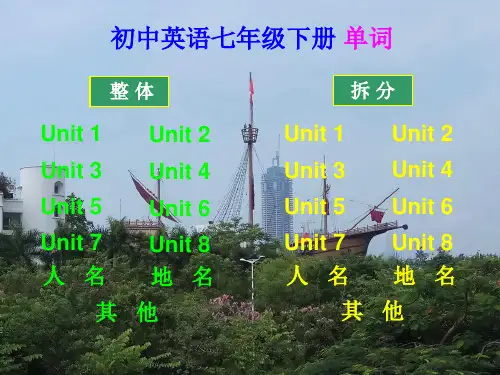
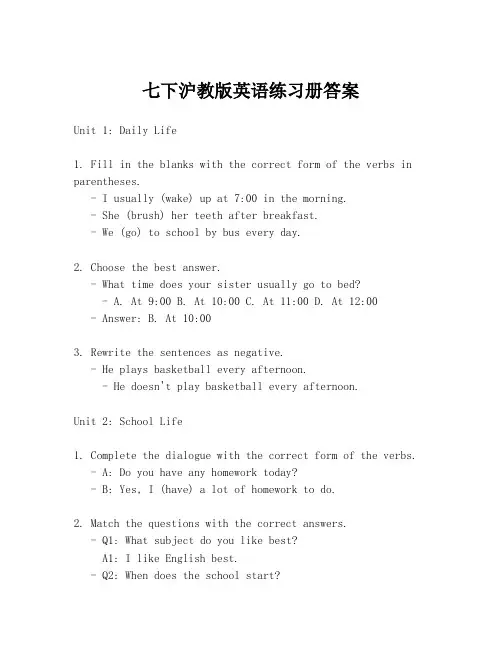
七下沪教版英语练习册答案Unit 1: Daily Life1. Fill in the blanks with the correct form of the verbs in parentheses.- I usually (wake) up at 7:00 in the morning.- She (brush) her teeth after breakfast.- We (go) to school by bus every day.2. Choose the best answer.- What time does your sister usually go to bed?- A. At 9:00 B. At 10:00 C. At 11:00 D. At 12:00- Answer: B. At 10:003. Rewrite the sentences as negative.- He plays basketball every afternoon.- He doesn't play basketball every afternoon.Unit 2: School Life1. Complete the dialogue with the correct form of the verbs. - A: Do you have any homework today?- B: Yes, I (have) a lot of homework to do.2. Match the questions with the correct answers.- Q1: What subject do you like best?A1: I like English best.- Q2: When does the school start?A2: The school starts at 8:00.3. Write sentences using the "there is/are" structure. - There is a library in our school.- There are many students in the classroom.Unit 3: Food and Drink1. Fill in the blanks with the correct prepositions. - I would like (for) lunch with my family.- We usually have dinner (at) 7:00.2. Choose the correct answer.- What would you like to eat?- A. A hamburger B. An apple C. Rice D. Soup- Answer: A. A hamburger3. Use the correct form of the comparative adjectives. - This apple is bigger than that one.Unit 4: Travel1. Rewrite the sentences in the past tense.- They are going to the beach this weekend.- They went to the beach last weekend.2. Choose the correct answer.- How did you go to the museum?- A. By car B. By train C. On foot D. By bus- Answer: B. By train3. Complete the sentences with the correct form of the verbs. - We (visit) the museum last month.Unit 5: Hobbies and Interests1. Fill in the blanks with the correct form of the verbs.- She (enjoy) reading books in her free time.2. Choose the correct answer.- What is your hobby?- A. Playing basketball B. Watching TV C. Drawing D. Singing- Answer: C. Drawing3. Write sentences using the "would rather" structure.- I would rather play soccer than watch TV.Unit 6: Weather and Seasons1. Fill in the blanks with the correct form of the verbs.- It (rain) heavily yesterday.2. Choose the correct answer.- What's the weather like today?- A. Sunny B. Cloudy C. Rainy D. Snowy- Answer: A. Sunny3. Use the correct form of the adjectives.- Winter is the coldest season of the year.Unit 7: Festivals and Celebrations1. Rewrite the sentences in the future tense.- They are having a party tonight.- They will have a party tonight.2. Choose the correct answer.- What festival do you celebrate in January?- A. Christmas B. New Year's Day C. Easter D. Halloween - Answer: B. New Year's Day3. Complete the sentences with the correct form of the verbs. - We always (get) together with our family during the Spring Festival.Unit 8: Animals1. Fill in the blanks with the correct form of the verbs.- The cat (sleep) on the sofa.2. Choose the correct answer.- What's your favorite animal?- A. Dog B. Cat C. Elephant D. Tiger- Answer: A. Dog3. Use the correct form of the comparative adjectives.- Elephants are bigger than dogs.结束语这份练习册答案仅供参考,希望能够帮助同学们更好地复习和掌握知识点。
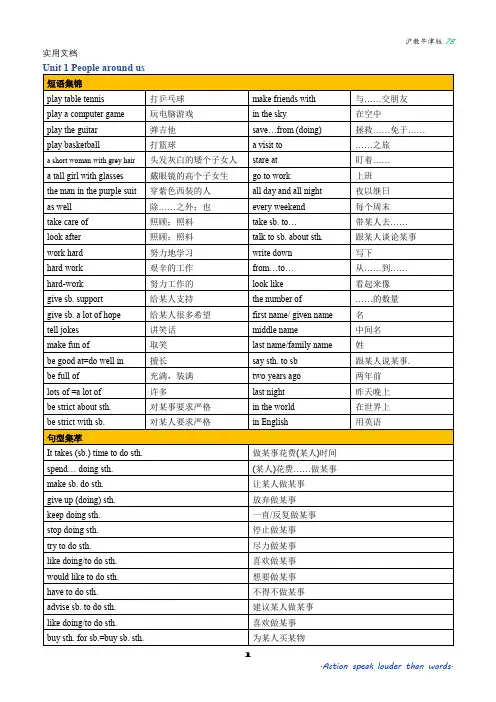
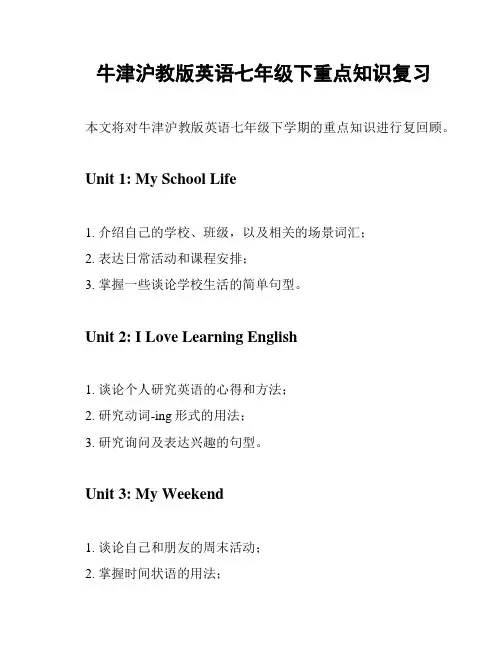
牛津沪教版英语七年级下重点知识复习
本文将对牛津沪教版英语七年级下学期的重点知识进行复回顾。
Unit 1: My School Life
1. 介绍自己的学校、班级,以及相关的场景词汇;
2. 表达日常活动和课程安排;
3. 掌握一些谈论学校生活的简单句型。
Unit 2: I Love Learning English
1. 谈论个人研究英语的心得和方法;
2. 研究动词-ing形式的用法;
3. 研究询问及表达兴趣的句型。
Unit 3: My Weekend
1. 谈论自己和朋友的周末活动;
2. 掌握时间状语的用法;
3. 掌握一些听力技巧。
Unit 4: Jobs
1. 研究表示职业的词汇;
2. 表达及询问个人志愿和理想。
Unit 5: Food and Drink
1. 研究食物和饮品的词汇;
2. 掌握询问及表述食物喜好和不喜好的方法。
Unit 6: Sports and Hobbies
1. 研究表示不同体育项目和爱好的单词;
2. 表达及询问个人感受和喜好。
Unit 7: Travelling
1. 谈论旅游的相关话题;
2. 表达和询问喜欢或不喜欢旅游的理由和偏好。
Unit 8: Festivals and Celebrations
1. 研究表示节日和庆祝活动的单词;
2. 谈论家庭或朋友间的庆祝活动。
总结
以上是牛津沪教版英语七年级下学期的重点知识复习,希望对大家的英语学习有所帮助。
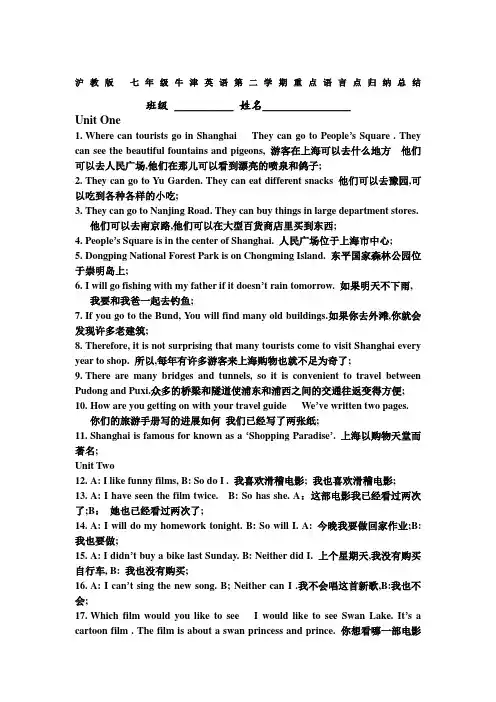
沪教版七年级牛津英语第二学期重点语言点归纳总结班级 __________ 姓名_______________Unit One1.Where can tourists go in Shanghai They can go to People’s Square . They can see the beautiful fountains and pigeons, 游客在上海可以去什么地方他们可以去人民广场,他们在那儿可以看到漂亮的喷泉和鸽子;2.They can go to Yu Garden. They can eat different snacks 他们可以去豫园,可以吃到各种各样的小吃;3.They can go to Nanjing Road. They can buy things in large department stores.他们可以去南京路,他们可以在大型百货商店里买到东西;4.People’s Square is in the center of Shanghai. 人民广场位于上海市中心;5.Dongping National Forest Park is on Chongming Island. 东平国家森林公园位于崇明岛上;6.I will go fishing with my father if it doesn’t rain tomorrow. 如果明天不下雨,我要和我爸一起去钓鱼;7.If you go to the Bund, You will find many old buildings.如果你去外滩,你就会发现许多老建筑;8.Therefore, it is not surprising that many tourists come to visit Shanghai every year to shop. 所以,每年有许多游客来上海购物也就不足为奇了;9.There are many bridges and tunnels, so it is convenient to travel between Pudong and Puxi.众多的桥梁和隧道使浦东和浦西之间的交通往返变得方便; 10.How are you getting on with your travel guide We’ve written two pages.你们的旅游手册写的进展如何我们已经写了两张纸;11.Shanghai is famous for known as a ‘Shopping Paradise’. 上海以购物天堂而著名;Unit Two12.A: I like funny films, B: So do I . 我喜欢滑稽电影; 我也喜欢滑稽电影;13.A: I have seen the film twice. B: So has she. A:这部电影我已经看过两次了;B:她也已经看过两次了;14.A: I will do my homework tonight. B: So will I. A: 今晚我要做回家作业;B:我也要做;15.A: I didn’t buy a bike last Sunday. B: Neither did I. 上个星期天,我没有购买自行车, B: 我也没有购买;16.A: I can’t sing the new song. B; Neither can I .我不会唱这首新歌,B:我也不会;17.Which film would you like to see I would like to see Swan Lake. It’s a cartoon film . The film is about a swan princess and prince. 你想看哪一部电影我想看天鹅湖,这是一部卡通片,这部电影是关于天鹅公主和王子之间的爱情故事;18.What /How about ‘Police Story’去看警察故事这部电影怎么样19.Shall we see <Monkey King> then 那么我们去看西游记好吗20.How much are they going to pay for the tickets altogether他们总共要花费多少钱购买这些票21.How much are you going to spend buying the tickets altogether22.How much are the tickets going to cost altogether23.Kitty, how can I get to City Cinema from my home First , turn left. Walk along Green Street;Next, turn right into Tree Road and walk along Tree Road . Then turn right into Sea Avenue and walk along Sea Avenue. Finally,turn left into Park Road and walk along Park Road .You will see City Cinema on your right.基蒂, 从我家到城市电影院怎么走首先,向左转,沿着绿街一直向前走,然后,向右转,进入大树路,沿着大树路一直向前走,然后,向左转,进入海洋大街,沿着海洋大街一直向前走,最后,向左转,进入公园大道,沿着公园大道一直向前走,在你的右边,你就会看到城市电影院;24.The duration of the film is 120 minutes. The film lasts 120 minutes. 这部电影持续时间为2个小时;25.My mother doesn’t enjoy seeing the film with a lot of action.我妈妈不喜欢动作片电影;26.The film is the most exciting film of the year. 这部电影是当年最精彩的电影; Unit Three27.We have learned English for five years. 我们学习英语已经有五年了;28.How long have you learned English 你们学习英语有几年了29.Mr Wang has taught us maths since we entered the school two years ago.自从两年前我们来到这个学校以来,王老师一直教我们数学;30.How long has Mr Wang taught you maths 王老师教你们数学有多久了31.Mr Wang has taught us Chinese since two years ago . 两年前以来,王老师一直教我们语文;32.How long has Mr Wang taught you Chinese 王老师教我们语文多久了33.Mr Zhang taught us English two years ago .两年前张老师教我们英语34.When did Mr Zhang teach you English 张老师什么时候教你们英语35.My father goes to see a film with my mother once a month .我爸爸一个月一次与我妈妈去看电影;36, How often does your father go to see a film with your mother多少时间你爸爸与你妈妈去看一次电影37, How many times does your father go to see a film with your mother a month一个月你爸爸与你妈妈一起去看几次电影38.I will visit my uncle next Sunday. 下个星期日我要去拜访一下我的舅舅;When will you visit your uncle 你什么时候去拜访你的舅舅39,She will finish the work in two hours.两个小时后,她要完成这项工作;How soon will she finish the work 多少时间以后她要完成这项工作40,I have kept the books from the library for two weeks.我从图书馆借这些书已经有两个星期了41.My aunt has been away from the city for ten years . 我舅妈离开这个城市有10年了;42.The old man has been dead for ten months. 这个老人已经死了10个月;43.I have had the bike for one year. 这辆自行车我买了已经有一年了;44.He used to read English in the evening. 他过去常常在晚上读英语;45.She is used to reading English in the morning. 她习惯于在早上读英语;46.A watch is used to tell the time. /.A watch is used for telling the time.手表是被用来报时的;47.The boy is eight years old.=He is an eight-year-old boy. 这个男孩八岁大了;48.Aunt Betty works in a company in Beijing, doesn’t she贝蒂阿姨在北京一家公司工作,是吗49.The boy’s never late for school, is he 这个男孩从来上学不迟到,是吗50.The boy’s never been to Japan, has he 这个男孩从来没有去过日本,是吗51.The girl has lunch at school every day, doesn’t she 这个女孩每天在学校里吃午餐,是吗52.The man can hardly believe the news, can he 这个人几乎不相信这条新闻,是吗53.Please help yourselves to the cakes ,children. 孩子们,请随便吃蛋糕;Unit Four54.Where will you go to buy a pair of jeans I will go to a clothes shop to buy a pair of jeans. 你要到哪里去购买一条牛仔裤我要到一家服装店购买;55.Let’s go shopping, shall we 让我们去购物,好吗56.She will go to buy a computer book for her father at the book shop tomorrow. 明天,她要在书店里为她爸爸购买一本计算机书;57.My mother bought me a dictionary yesterday. My mother bought a dictionary for me yesterday. 我妈妈昨天为我买了一本词典;58.He need buy a bike. He needn’t buy a bike. 他需要买一辆自行车; 他不需要买一辆自行车;59.He needs to buy a bike. He doesn’t need to buy a bike.60.Does he go to school on foot or by car every day He goes to school on foot.他每天是步行去学校还是乘汽车上学校的他是步行上学的;61.Do you like the jeans with the yellow belt or the ones with the blue beltI like the ones with the blue belt. 你喜欢有黄色腰带的牛仔裤还是有蓝色腰带的牛仔裤我喜欢有蓝色腰带的牛仔裤;62.Will you buy the dress with blue spots or the one with the red spots next Saturday 下个星期日你要买有蓝色点的裙子还是有红色点的裙子63.These jeans are too long and tight.Do you have them in my size I wear medium. 这些牛仔裤既太长,又太紧;你们有我穿的号码大小的牛仔裤吗我是穿中号大小;64.Sorry, we don’t have them in your size. 对不起,我们没有你穿的尺码;65.A:Excuse me, Can I try on the jeans with blue beltB: Certainly. The changing rooms are over there.劳驾,我可以试穿一下有蓝色腰带的牛仔裤吗当然可以,试衣间在那边; 66.I will arrive in Shanghai on the night of March 27. 我将在三月二十七日晚上到达上海;67.Can you give me some suggestions for my visit to Shanghai你能给我参观上海提一些建议吗Unit Five.68.Although it is raining hard, the boys of our class are playing football in the playground.The boys of our class are playing football in the playground although it is raining heavily.It is raining hard ,but the boys of our class are playing football in the playground.虽然天正在下大雨,但是,我们班级的男孩还是在操场上踢足球;69.Although they are old,they work in the fields every day. 虽然他们年纪大了,但是他们每天在地里劳动;70.They live happily although they are poor.虽然他们很穷,但是,他们快乐地生活;71.Although their clothes are old, they are still comfortable.虽然,他们的衣服很旧了,但是,穿起来还很舒服;72.I hope other people will learn from you .我希望其他人要向你学习;73.Long ago, there was a poor farmer called /named Fred.很久以前,有一个名叫弗莱德的贫穷农民;74.I wish you happiness and health forever. 我祝你们永远快乐健康;75.We are going to vote for model students.我们要投票选举模范学生;Unit Six76.I started / began to learn English at the age of five. 我五岁的时候,就开始学习英语;77.The girl started /began to sing English songs when she was nine years old.这个女孩九岁时,开始唱英语歌;We must work hard for a better life. 为了美好的生活,我们一定要努力学习; What does spring make you think of 春天使得你想起来什么78. Spring makes me think of rain. It’s awful to walk in wet and dirty streets.春天使得我想到了多雨的天气; 在既潮湿又肮脏的马路上走路是糟糕的; Summer makes me think of going swimming in the sea. It’s interesting to go swimming in the sea in summer. 夏天使得我想到了可以到海里游泳;夏天在海里游泳是有趣的;Autumn makes me think of an/the autumn outing. It is fun to have an outing in autumn.秋天使得我想到了秋游;在秋天出去游玩是有趣的;Winter makes me think of making a snowman, It’s happy to make a snowman in winter.冬天使得我想到了做雪人; 在冬天做雪人是很快乐的;79.I saw the boys playing football yesterday. 昨天,我看到过这些男孩踢过足球;80.I saw the boys playing football at four yesterday. 昨天下午四点钟,我看到这些男孩正在踢足球;81.The summer holidays are coming . 暑假就要来了;82.They are leaving for Beijing soon. 很快他们就要去北京了;83.All summer, the grasshopper sat in the sun and sang happily all the time.整个夏天,蚂蚱一直在阳光下闲坐着,快乐地唱歌;84.At last,winter came,the grasshopper was outside in the snow. 终于冬天来了,蚂蚱只好待在冰天雪地的外面;85.The ant heard the grasshopper and came out of his warm house to help him .蚂蚁听到蚂蚱的情况,然后从温暖的家里出来帮助他;86.When spring comes, the grasshopper will work hard like the ant. 当春天来到的时候,蚂蚱也要像蚂蚁一样努力劳动;Unit seven87.My aunt in America knows little about China, does she 在美国的阿姨几乎不知道关于中国的情况,是吗88.WTO stands for World Trade Organization. WTO表示世界贸易组织;89.What do you think will happen in the future你认为将来会发生什么90.A: Perhaps people will be able to live on the other planets in the future.B: I think so.91.A: 也许人类在将来能够在其它行星上生活; B:我也是这样认为的;92.A: Perhaps there will be no water or air on the Earth in the future.B: I don’t think so.A:也许在将来地球上既没有水,也没有空气;B:我不这么认为;93.I think perhaps people will able to grow vegetables in space stations in the future.我认为也许人们在将来能在太空站上种蔬菜;94.I think people in different countries will all able to speak the same language in the future. 我认为在将来也许不同国家的人能够讲相同的语言;95.There are many trees on either side both sides of the street. 在马路两旁有许多树;96.Maybe there will be cities under the sea in the future. 也许在将来海底下有城市;97.Maybe people will be able to travel to other planets in spacecraft in the future. 也许在将来我们能乘宇宙飞船去其它行星旅游;98.People may take pills for meals in the future. 人们在将来可能服用药片代替吃饭;99.I hope that there will be enough food for everyone in ten years’time.我希望在10年时间里人人都要有足够的食物吃;100.I hope that people will not pollute the Earth. 我希望人们不污染地球; 101.I hope that I will become an astronaut in ten years.我希望10年后,将成为一名宇航员;102.Close the box and seal it with tape. 合上盆子,用胶带封好;Unit Eight.103.What changes would you like to see in our school 你想看到在我们学校里有什么变化104.I’d like to have a swimming pool in our school . 我想在我们学校里要有一个游泳池;105.I’d like to have more books and magazines in the library.我想在图书馆里要有更多的书和杂志;106.I would like to have modern science laboratories and do more experiments.我想拥有几个现代化的科学实验室,并且做更多的实验;107.It would be impossible to have less homework. 要几乎没有回家作业是不可能的;108.It would be necessary to have more P.E lessons. 上更多的体育课是必要的; 109.It would be useful to have more computer lessons in our school.在我们学校里上更多的电脑课是有用的;110.Our classroom looks old and untidy.我们的教室看上去既旧又不整洁; 111.We can decorate the display boards ourselves. 我们能够亲自把展板装饰一下;112.Peter can put up some posters on the wall himself. 彼得能够亲自在墙上挂几张海报;113.I can sweep the floor myself . 我能够亲自拖地板;114.They can clean up their desks themselves.他们能够亲自打扫干净他们的桌子;115.You should conduct a survey how to be a model student yourself at the weekend. 周末,你应该亲自做一次如何成为一名模范学生的调查;116.Although Maths is difficult for him, he never gives it up.虽然数学对他来说很难,但是他从来没有放弃学习数学;117.Can you make some changes to your classroom yourselves你们自己能对你们的教室作一些改变吗118.The little boy can brush his teeth himself. 这个小男孩能自己刷牙;Unit Nine49, The children made the kites themselves. 孩子们亲自做风筝;119.I met one of my old friends an old friend of mine in the street last night.昨天晚上我在街上碰到了我的一个老朋友;120.My mother will come to school tomorrow . Will yours come to school 我的妈妈明天要来学校.你的妈妈也要来吗121.I left my book at home this morning.今天早上我把我的书忘记在家里了;122.Whose book did you leave at home this morning今天早上你把谁的书忘记在家里了123.His bike is blue. Hers is red. 他的自行车是蓝色的,她的自行车是红的; 124.The Sun is bigger than the Earth. 太阳比地球大;125.The Earth is smaller than the Sun. 地球比太阳小;126.The Earth is not as/so big as the Sun. 地球没有太阳大;127.Tom does his homework more carefully than Alice.汤姆做回家作业比爱丽丝认真;128.Alice does her homework more carelessly than Tom.爱丽斯做回家作业比汤姆粗心;129.Alice doesn’t do her homework as / so carefully as Tom.爱丽斯做回家作业没有汤姆一样认真;130.Which is the biggest , the Sun ,the Earth or the Moon太阳,地球和月亮哪一个最大131.Jack runs fastest in the school. 杰克是我们学校里跑的最快的;132.Shanghai is one of the most beautiful cities in the world.上海是世界上最美的城市之一;133.I am as strong as he. 我和他一样强壮;134.She is feeling much better. 现在她感觉好多了;135.He is the tallest boy in our class. 他是我们班级里最高的男孩;136.Class, have you read the story about the competition between Mr Wind and Mr Sun 同学们,你们看过风先生和太阳先生比赛的故事吗137.Let’s see who can get his coat off in the shortest time.让我们看看谁能在最短的时间里使得他脱掉衣服;138.Their kite is not as colourful as ours. 他们的风筝不如我们的风筝五彩缤纷; 139.Flowers bow and sway among the grass. 花儿在草丛中摇曳;Unit 10140.What happens when water boils 当水沸腾的时候,会发生什么情况141.It turns into steam when water boils. 当水沸腾的时候,水会变成水蒸气; 142.It turns into ice when water freezes. 当水冻结的时候,它就变成了冰;143.It turns into water when ice melts. 当冰融化的时候,冰就变成水;144.It turns into water when steam cools down. 当水蒸气变冷的时候,它会变成水;145.There is a sign near the river. The sign means people mustn’t swim in the river because the water in the river isn’t clean enough / is too dirty/ is too deep. It is dangerous for people to swim in the river.在这条河附近有一个标志,这个标志的意思是人们不能在这条河里游泳,因为这条河里的水不够干净太脏了、太深了; 在这条河里游泳是危险的;146.The sign means no smoking here. 这条标志的意思是这里严禁吸烟;Smoking is not allowed here.Don’t smoke here.You mustn’t smoke here.147.We usually find this sign at a swimming pool. The sign means people mustn’t diving here/ No diving/ Diving is not allowed / Don’t dive.我们通常在游泳池旁发现这个标志,这个标志的意思是严禁人们在这里跳水; 148.Shanghai is becoming more and more beautiful.上海变得越来越漂亮了;149.The harder you work, the greater you will make progress. /The harder you try, the greater your progress is.你越努力学习,你将会取得更大的进步;。
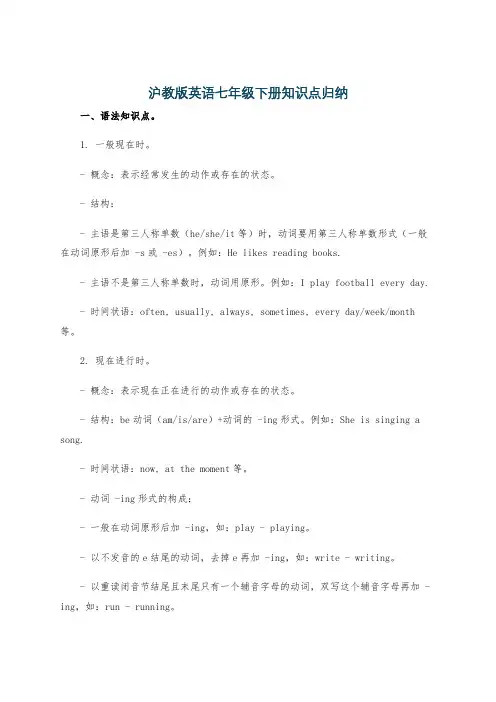
沪教版英语七年级下册知识点归纳一、语法知识点。
1. 一般现在时。
- 概念:表示经常发生的动作或存在的状态。
- 结构:- 主语是第三人称单数(he/she/it等)时,动词要用第三人称单数形式(一般在动词原形后加 -s或 -es)。
例如:He likes reading books.- 主语不是第三人称单数时,动词用原形。
例如:I play football every day.- 时间状语:often, usually, always, sometimes, every day/week/month 等。
2. 现在进行时。
- 概念:表示现在正在进行的动作或存在的状态。
- 结构:be动词(am/is/are)+动词的 -ing形式。
例如:She is singing a song.- 时间状语:now, at the moment等。
- 动词 -ing形式的构成:- 一般在动词原形后加 -ing,如:play - playing。
- 以不发音的e结尾的动词,去掉e再加 -ing,如:write - writing。
- 以重读闭音节结尾且末尾只有一个辅音字母的动词,双写这个辅音字母再加 -ing,如:run - running。
3. 形容词的比较级和最高级。
- 比较级:- 构成:- 一般在形容词原级后加 -er,如:tall - taller。
- 以e结尾的形容词,加 -r,如:nice - nicer。
- 以重读闭音节结尾且末尾只有一个辅音字母的形容词,双写这个辅音字母再加-er,如:big - bigger。
- 多音节形容词和部分双音节形容词,在原级前加more,如:beautiful - more beautiful。
- 用法:用于两者之间的比较,常用结构为“A+be+比较级+than + B”,例如:This book is more interesting than that one.- 最高级:- 构成:- 一般在形容词原级后加 -est,如:tall - tallest。
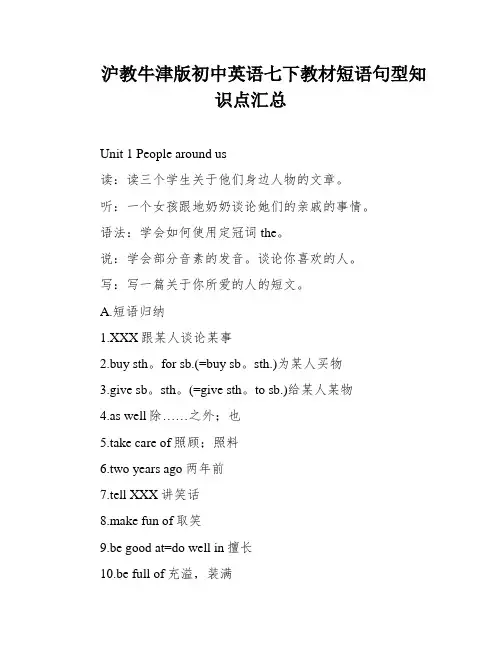
沪教牛津版初中英语七下教材短语句型知识点汇总Unit 1 People around us读:读三个学生关于他们身边人物的文章。
听:一个女孩跟地奶奶谈论她们的亲戚的事情。
语法:学会如何使用定冠词the。
说:学会部分音素的发音。
谈论你喜欢的人。
写:写一篇关于你所爱的人的短文。
A.短语归纳1.XXX跟某人谈论某事2.buy sth。
for sb.(=buy sb。
sth.)为某人买物3.give sb。
sth。
(=give sth。
to sb.)给某人某物4.as well除……之外;也5.take care of照顾;照料6.two years ago两年前7.tell XXX讲笑话8.make fun of取笑9.be good at=do well in擅长10.be full of充溢,装满11.lots of许多12.make friends with与……交朋友13.save…from (doing)拯救……免于……14.from…to…从……到……15.be XXX对某事要求严格16.look like看起来像17.go to work上班18.all day and all night通宵达旦19.XXX在某方面帮助某人20.hard work辛苦的工作21.the number of……的数量22.first name名23.middle name中间名st name姓25.XXX sb跟或人说某事.26.in the world在天下上27.study hard努力研究28.play table XXX打乒乓球29.give sb。
support给或人撑持30.write down写下31.look after照顾32.give sb。
a lot of hope给某人很多希望33.in the sky在空中st night昨天晚上35.a visit to……之旅36.play a computer game玩电脑游戏初一下册37.play the guitar弹吉他38.play XXX打篮球39.the man in the purple suit穿紫色西装的人40.have to不得不41.every weekend每一个周末42.XXX…带或人去……B.句型归结1.It XXX time to do sth.破费工夫做某事2.make sb。
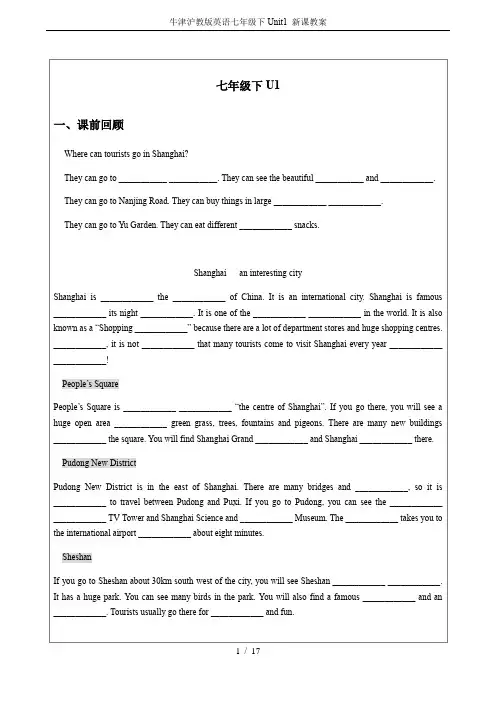
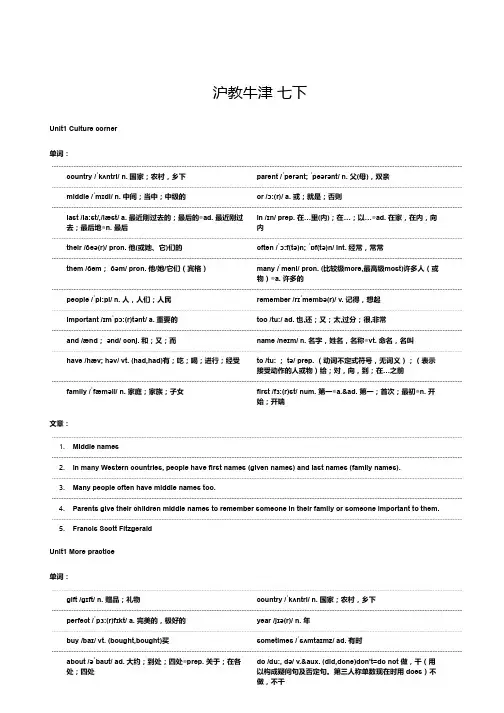
country/ˈkʌntri/n. 国家;农村,乡下parent/ˈperənt; ˈpeərənt/ n. 父(母),双亲middle/ˈmɪdl/n. 中间;当中;中级的or/ɔ:(r)/a. 或;就是;否则last/la:st/,/læst/a. 最近刚过去的;最后的◎ad. 最近刚过去;最后地◎n. 最后in/ɪn/prep. 在…里(内);在…;以…◎ad. 在家,在内,向内their/ðeə(r)/pron. 他(或她、它)们的often/ˈɔ:f(tə)n; ˈɒf(tə)n/int. 经常,常常them/ðem; ðəm/pron. 他/她/它们(宾格)many/ˈmeni/ pron. (比较级more,最高级most)许多人(或物)◎a. 许多的people/ˈpi:pl/ n. 人,人们;人民remember/rɪˈmembə(r)/v. 记得,想起important/ɪmˈpɔ:(r)tənt/a. 重要的too/tu:/ad. 也,还;又;太,过分;很,非常and/ænd; ənd/conj. 和;又;而name/neɪm/n. 名字,姓名,名称◎vt. 命名,名叫have/hæv; həv/vt. (had,had)有;吃;喝;进行;经受to/tu: ; tə/prep. (动词不定式符号,无词义);(表示接受动作的人或物)给;对,向,到;在…之前family/ˈfæməli/ n. 家庭;家族;子女first/fɜ:(r)st/num. 第一◎a.&ad. 第一;首次;最初◎n. 开始;开端gift/gɪft/n. 赠品;礼物country/ˈkʌntri/n. 国家;农村,乡下perfect/ˈpɜ:(r)fɪkt/a. 完美的,极好的year/jɪə(r)/n. 年buy/baɪ/vt. (bought,bought)买sometimes/ˈsʌmtaɪmz/ ad. 有时about/əˈbaʊt/ad. 大约;到处;四处◎prep. 关于;在各处;四处do/du:, də/v.&aux. (did,done)don't=do not 做,干(用以构成疑问句及否定句。

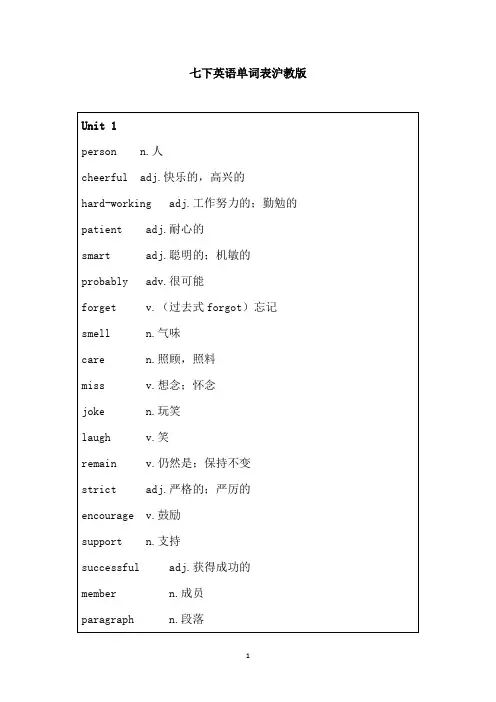
一.重点词组1 be famous for .... 以。
而著名Thailand is famous for its palaces.Be known as .....被认为,被誉为Moyan is known as a great writer.联想:work for /work as2.--ing形容词、 --ed 形容词Interesting (an interesting book) relaxing exciting surprising pleasantInterested(be interested in) relaxed excited surprised pleased3 get on with 进展。
How are you getting on with your projectHow are you getting on with your travel guide4 take part in (take an active part in 积极参加) 与 join 的区别Take part in 表示“参加某项活动”Join 表示“参加或加入组织或团体”Tom will take part in the 100-metre-race at the school sports meeting.My brother joined the party two years ago.(My brother has joined the party for two years. 错)(My brother has been a number of the party for two years 对)团: league Communist Youth leaguage of China.Communist party of China5.Decide to do sth /decide not to do sthShe decided to live in London.I decided not to leave Shanghai.联想:tell /ask /warn /would rather 的用法6.Have been to / have gone to /have been inI have been to Beijing three times.----- Where is he---- He has gone to Beijing.I have been in Dalian for 5 yeaes.7.In the centre of / in middle of 的区别There is a fountain in the centre of the square . (中心位置) There is a big stone in the middle of the road. (只空间)指时间)8两个物体之间的位置关系A 包含B A与B接壤B is in the south of A. B is on the south of A A与B 不相邻B is (to the )south of A.9.填入适当的介词_____ the Chongming Island. _______ the Blue Bay. _____ the Lucky town.二.重点句型1.Therefore, it is not surprising that many tourists come to visit Shanghai everyyear to shop.It is + adj + that 从句“表达对某事的看法”It is wonderful that we can have dinner in this beautiful room.It is + adj + to do sth “表达对某事的看法”There are many bridges and tunnels. So it is convenient to travel between Pudong and Puxi.2. If you go there, you will see a huge open area with green grass, trees, fountains and pigeons.If 引导的“主将从现句”If it rains tomorrow, I won’t go there with you.3. The Maglev takes you to the international airpoart in about eight minutes.In + 一段时间表达两个意思:在一段时间内,句子常用一般现在是或一般过去时There was once an artist. He could draw a beautiful horse in five minutes.在一段时间之后,句子常用一般将来时What will you be like in 20 years’ time4.If you go to Sheshan about 30km southwest of the city.距离+方位+of 表达“一个地方相对于另一个地方的方位和距离”The Great Wall is 130 kilometres north of the city of Beijing.【练习】一.Choose the best answer1.If it ______ tomorrow, we _______ stay at home.A will rain...will.B rains...will.C will rain...can.D rain...can.2.Shanghai is one of _______ in China.A the large cities.B the larger city.C the larger cities.D the largest citiest.3.There____ a huge open area of green grass in front of our school building.A has.B have.C is.D are.4._____ is known ______ “the centre of Shanghai”A.The Bund...for.B. People’s Square ...as.C .The Bund...as.D People’s Square ...for.5.Pudong New District is ______ the east of Shanghai.A on.B at.C in.D to.6.______ is not _______ that he can run that fast.A.It ....surprising.B. It ....surprised.C there....surprising.D there ....surprised.7.Sichuan is ______ its spicy food.A famous for.B is famous for.C known as.D is know as.8.Sheshan is about ________ Shanghai.A 30 km in the southwest.B 30 km southwest of.C 30 km in southwest.D 30 km southwest9.______ are you getting on with your projectA.What.B. How.C. Which.D. Why.10.Many tourists go to Paris every year_____.A to shop.B shop.C shops.D shopping.二.用所给单词的适当形式填空1.Tokyo is an_____ (national) city with a population of 12 million.2.There are a lot of tall ______ (build) along Nanjing Road.3.Would you please tell me the way to the nearest ______ (shop) centrer4.Beijing is ______ (fame) for its local snacks and Beijing-style houses.5.It is quite ______(surprise) that Mandy got the first prize in the singing competition.6.I’d like to give a party in this famous ______ (float) restaurant.7.Shanghai is one of the ______ (large) cities in the world.8.We usually go there for _____(funny)三.按要求改写句子1.They have already packed their suitcases. (改为否定句)They_______packed their suitcases_______.2.Tourists usually go shopping in Shanghai. (就画线部分提问)______ do tourists usually ____ in Shanghai3.We are going to stay at the airport for two hours.(就画线部分提问)_____ _______ are you going to stay at the airport4.I know only a little about Pudong New District. (就画线部分提问)_____ _______ do you know about Pudong New District5.They have just been to Shanghai.(改为一般疑问句)_____ they ______ to Shanghai yet6.You will find the Century Park in Pudong, too.(保持句意不变)You will ______ find the Century Park in Pudong.B. Choose the best answer(根据短文内容,选择最恰当的答案): (共5分)Jeff was worried about his weight. ‘I’m much fatter,’ he told his friend. ‘I need to lose a lot of weight (减肥)but I don’t know how to do it.’‘Go and see Dr. Bush,’his friend said. ‘He will tell you how to lose weight.’Jeff visited Dr. Bush and told him his problem. ‘It is easy to lose weight,’Dr. Bush told him. ‘First, you must look after yourself. You should go to bed early and have enough sleep every day. Then you must have a healthy diet. Eat a lot of fruit and vegetables. Also, you should eat some fish and meat. But don’t eat too much fried food. Finally, you must have some kinds of sports. For example, you can take a walk after dinner, or go jogging (慢跑) in the morning. All these are good for your health.’Jeff took Dr. Bush’s suggestions and promised to do so. A few weeks later, Jeff’s friend met him and was surprised to find Jeff was much healthier than before. ‘I did as Dr. Bush told me.’Jeff told his friend, ‘I don’t worry about my weight any more.’1. Jeff was worried about _______.A. his friendB. his weightC. Dr. BushD. his sleep2. Dr. Bush thought it was _______ to lose weight.A. hardB. niceC. not easyD. not difficult3. Dr. Bush told Jeff not to _______.A. go to bed earlyB. eat a lot of fruit and vegetablesC. eat too much fried foodD. take a walk4. Dr. Bush gave Jeff _______suggestions.A. twoB. threeC. fourD. five5. Jeff became healthier than before because _______.A. he looked after himselfB. he had a lot of fruitC. he had much sleep every dayD. he took Dr. Bush’s suggestionsC. Choose the words or expressions and complete the passage(选择最恰当的单词或词语完成短文):(共6分)Looe is the most beautiful seaside town of south-east Cornwall. You’ll find it 1_______ to visit the small town. There are many different 2_______ of restaurant by the river. You can enjoy seafood there. You can 3_______ walk along the river, or go boating and fishing on the river. If you like, you can visit the Looe Museum. You can find the 4_______ of the town. It’s easy to get to Looe. You can get there 5_______ train or take a boat along the river. So if you go to Cornwall, 6_______ forget to visit Looe.1. A. delicious B. fun C. helpful D. healthy2. A. kinds B. packets C. places D. sections3. A. too B. only C. already D. also4. A. menu B. history C. porridge D. suggestions5. A. with B. on C. by D. in6. A. don’t B. mustn’t C. can’t D. shouldn’tD. Read the passage and fill in the blanks with proper words(在短文的空格内填入适当的词,使其内容通顺,每空格限填一词,首字母已给):(共6分)Many young people like eating out, but do you know how to eat out and how to choose healthy food Here are some tips:When you’re eating out in a r_______ or a snack bar, don’t have too many soft drinks. Soft drinks have a lot of s_______ and can make you fat easily.Don’t order too much food for yourself. If you have to buy a complete meal(套餐), you can s_______ your food with your friend, or take the left of your food home.Choose some f_______ fruit or vegetables. They are good for your h_______.Don’t order fried food. Fried food is high in fat. So, ask for steamed, baked, or roasted food. If you are not sure about a certain dish, ask the w_______ how it is made.E. Answer the questions(根据短文内容回答下列问题): (共6分)Frank learns to cook when he is at school. He has two lessons a week. He always cooks the food well and then eats it. He passed a cooking examination(考试) last year.But Frank learns more about cooking at home from his mother because he oftenhelps his mother in the kitchen, and sometimes he cooks a meal alone.There is an oven in Frank’s kitchen, and it is quite easy to bake things in it. His mother says that Frank can make a chocolate cake best. He puts flour, butter, sugar, eggs and chocolate in it. He mixes them in a bowl and then puts them in a baking-tin. Then he puts the tin in the oven and bakes it for one and a half hours.He also makes jam. In summer and autumn, when the fruit is cheap, he buys a lot and boils it with sugar. Then he puts it in pots and puts the pots in a cupboard. In winter and spring, when the fruit is expensive because there is not much of it, the jam is very useful.Frank loves cooking.1.Where does Frank learn to cook2.When did Frank pass a cooking examination3.Why is it quite easy to bake things in Frank’s kitchen4.What kind of cake can Frank make best5.When does Frank make jam6.Why does Frank make jam at that timeII. Writing (写话): (共10分)Write at least 50 words about the topic “On the way to school”. (以“上学路上”为题写一篇不少于50个词的短文,标点符号不占格)Suggested questions:Do you live near or far away from schoolHow do you go to school every dayWhat can you see on the way to school。
沪教牛津版七年级下册初中英语全册教案(教学设计)Unit 1 People around us 教案课题:Unit 1 --- People around us (阅读课)课时:第 1 课时,共4课时课型:new words教学目标:1.To know the meaning of the new words and the students can use the words to make sentences.2.To train the students’ ability o f cooperation.教学重点: The pronunciation and the usages of the new words: cheerful , hard-working , patient, person, smart, forget, smell , strict, encourage, remain , support successful, remember.教学难点: The usages of the new words: forget , remember , patient , strict, remain , strict.教学准备: e some pictures and games and PPT .2.a recorder .教学步骤:Step 1 Warming up. Freely talk:who do you like best around you ?show some pictures of teacher,father ,mother,friend, on the PPT to talk about them.Step 2 New words.1.Read the new words after the teacher or the tape.2.Group work to remember the new words3.Help the students when they have trouble in reading the new wordsStep 3 Key words learning.1.Show the PPT of the meaning of the key words for them to finish Part A1.2. Let Ss make more sentences with the new words .Step 4 Have a competitioncheck the words and give them marks for the groupsstep5 ReadingBefore reading : 1.Ask Ss to look at the pictures and the titles of the three articles on page 3.2.Check their answers.While reading : 1.Read the article quickly, and then finish Part D1.2. Check their answers.Post reading: 1.Ask Ss to finish Part C1 and C2.2. Check their answers.Step 6 Reciting the article1.Play the tape for them to listen and repeat.2.Show PPT for them to retell the article.ExercisesTo consulate the usages of the new wordsstep 7 SummaryGive them a piece of paper to write the words.Step 8 Homework1.Dictation2.correct the mistakesStep9 The blackboard designUnit 1 People around us1. be cheerful快乐2.as well 也3.take care of 照顾4.tell jokes 讲笑话5.make sb laugh 使某人发笑6.be good at 擅长于…7.be strict in sth 对某事严格要求be strict with sb对某人严格要求课题:Unit 1 People around us (听说课)课时:第2课时,共 4 课时课型:Listening & Speaking教学目标:1.Learn how to use the new words or phrases to describe a person2. improve their listening and speaking skills教学重点: To catch the missing words when listening教学难点: Learn to take note quickly when listening教学准备: Group work. Self—study教学步骤:Step 1: Prepare for the listening and speakingReview some words and phrases which can be used to describe a person Step 2: Do the listening1.Play the listening materials , stop when necessary2.Check the answersStep3.SpeakingGive a sample dialogue to students and ask them to imitate itStep 4:Make notes about the listening.1.Tell them to find the key words.2.Write down the key words you get in the listening part.Step5 Speaking1.学习双元音/iə/、/eə/、/uə/1)Read after the teacher or the tape.2)Read by themselves.2.Listen to the tape and finish A1 then check their answers.3.Learn A2. Ask Ss to read these sentences. Pay attention to the letters in red.4.Speaking upWork in groups to discuss the people they like .S1: Who do you like?S2: I like …S1: What does/did he/she look like?…Step6:Sum upStep7HomeworkStep8 The blackboard designUnit 1 People around us1.描写人的外貌的词2. 双元音/iə/、/eə/、/uə/课题:Unit 1 People around us(语法及运用课)课时:第3时,共 4 课时课型:Grammar教学目标:1.to grasp the usage of the definite word the and the preposition with2. to raise the students’ ability to sum up some language rules教学重点: Know when should use the in front of a noun and when we should not use it and the usage of the with phrases to describe a person教学难点: When we should not use the in front of a noun.教学准备:PPT, Blackboard教学步骤:Step1:Free talkTalk about the noun with an, a and the .Step2: WritingBefore writing: Give Ss the title of the article to talk about.1.Who are you going to write about?2.Think about the following ideas.1)a family member2)a good friend3)a teacher or a great personWhile writing:1.Write a short article about this person.Show some PPT to help them to write the article.2.介绍一些描述人常用的词汇.3. Ask Ss to re ad “My dad”as an example.Step3:More practiceAsk Ss to re ad the article about Mother’s Day quickly.Then answer the questions.1.When is Mother’s Day?2.What do people like to do this day?3.What do the author advise people to do on this day?Step4 Study skills1.Learn line graphs and bar charts to show the change in numbers.2.Fill in the blanks.3.Check their answers.Step 4:Culture corner1.Introduce middle names for Ss.2.Write some famous people’s middle names.Step5:Sum up1.Go over the rules of theStep6: HomeworkStep7 The blackboard design1.冠词“a\an”的用法。
七年级下册英语沪教版单词表Unit 1 People around us.1. person /ˈpɜːsn/ n. 人。
2. cheerful /ˈtʃɪəfl/ adj. 快乐的;高兴的。
3. hard - working /ˌhɑː d ˈwɜːkɪŋ/ adj. 工作努力的;辛勤的。
4. patient /ˈpeɪʃnt/ adj. 耐心的。
5. smart /smɑːt/ adj. 聪明的;机敏的。
6. probably /ˈprɒbəbli/ adv. 很可能;大概。
7. forget /fəˈɡet/ v. (forgot, forgotten) 忘记。
8. smell /smel/ n. 气味 v. 嗅;闻;有……气味。
9. care /keə(r)/ n. 照顾;照料 v. 在意;关心;担心。
10. miss /mɪs/ v. 想念;思念;错过。
Unit 2 Travelling around the world.1. France /frɑːns/ n. 法国。
2. flag /flæɡ/ n. 旗帜。
3. capital /ˈkæpɪtl/ n. 首都;国都。
4. European /ˌjʊərəˈpiːən/ adj. 欧洲的;全欧的;欧盟的。
5. wide /waɪd/ adj. 宽的;宽阔的。
6. wonderful /ˈwʌndəfl/ adj. 美妙的;精彩的。
7. receive /rɪˈsiːv/ v. 收到;接到。
8. postcard /ˈpəʊstkɑːd/ n. 明信片。
Unit 3 Our animal friends.1. blind /blaɪnd/ adj. 瞎的;失明的。
2. radio /ˈreɪdiəʊ/ n. 无线电广播;收音机。
3. helpful /ˈhelpfl/ adj. 有用的;有帮助的。
4. rescue /ˈreskjuː/ v. & n. 营救;援救。
七下英语沪教版unit three作文全文共10篇示例,供读者参考篇1Unit Three in our English textbook is super fun! It's all about hobbies and interests. I want to tell you all about it!First, we learned how to talk about our hobbies in English. My hobby is drawing. I love to draw all kinds of things like animals, flowers, and even my favorite cartoon characters. What's your hobby? Do you like playing sports, reading books, or maybe listening to music? It's so cool to share our hobbies with each other.Next, we learned some new words related to hobbies. There are words like "painting", "singing", "dancing", and "collecting". I didn't know there were so many different hobbies out there! It's amazing to learn about all the things people like to do in their free time.We also practiced asking and answering questions about hobbies. We can ask questions like "Do you like playing video games?" or "How often do you go hiking?" It's a great way to start a conversation and learn more about our friends.One of my favorite parts of this unit was the story about Amy and her hobby of photography. She takes amazing pictures of her friends and family. It inspired me to get my own camera and start taking photos too! Maybe one day I'll be as good as Amy.Overall, Unit Three was really exciting and interesting. I can't wait to learn more about hobbies and maybe even try some new ones myself. English class is the best!篇2Unit Three in our English book is super cool! We learned about different countries around the world and their cultures. It was so interesting to read about all the fun facts and traditions.One of the countries we learned about was Japan. Did you know that Japan is famous for its cherry blossoms and delicious sushi? I really want to visit Japan one day and try all the yummy food! Another country we learned about was Egypt. I was amazed by the pyramids and the ancient history of the pharaohs. It would be so cool to see the desert and ride a camel!I also enjoyed reading about the festivals in different countries. The Lantern Festival in China sounds so magical with all the colorful lanterns and dragon dances. And the Day of theDead in Mexico is a unique way to remember loved ones who have passed away.Overall, I had a lot of fun learning about different countries and cultures in Unit Three. It makes me want to travel the world and experience all the amazing things each country has to offer. I can't wait to learn more in the next unit!篇3Hello everyone, today I want to share with you about Unit Three of our English textbook!In this unit, we learn a lot of interesting things. For example, we learned about different types of music like pop, rock, and classical. It was so fun to listen to the music and talk about our favorite songs. We also learned about different musical instruments and even got to try playing them in class. My favorite instrument is the guitar because it sounds so cool!Another thing we learned about in Unit Three is different places in our city. We talked about the library, the park, the zoo, and many more. It was interesting to learn about the different activities you can do in each place. I like going to the park because I can play with my friends and have a picnic with my family.One of my favorite parts of Unit Three was learning about different jobs. We talked about doctors, teachers, firefighters, and many more. It was cool to learn about what each job involves and how they help people. I want to be a teacher when I grow up because I like helping others learn new things.Overall, I really enjoyed learning about music, places in our city, and different jobs in Unit Three. I can't wait to learn more in the next unit! Thank you for reading my essay. Bye bye!篇4Unit Three: My weekendLast weekend, I had a super fun time with my family and friends. On Saturday morning, I woke up early and had a yummy breakfast. Then, my mom took me to the park to play with my friends. We played on the swings, slides, and even had a picnic under a big tree. I brought my favorite toy car to play with and we had a race to see who was the fastest. It was so much fun running around and laughing with my friends.In the afternoon, my dad took me to the movies to watch a new cartoon. I got popcorn and soda, and we sat in the comfy seats to watch the movie. It was so exciting and funny, I laughed a lot and even got a little scared during the action scenes. Afterthe movie, we went to my favorite ice cream shop and I got a big scoop of chocolate ice cream with sprinkles on top.On Sunday, we went to visit my grandparents who live in the countryside. I love going to their house because they have a big garden with lots of flowers and vegetables. I helped my grandpa water the plants and my grandma taught me how to pick ripe tomatoes. We had a delicious lunch together and then went for a walk in the fields. It was so peaceful and quiet, I loved being surrounded by nature.Overall, my weekend was full of fun activities and quality time with my family and friends. I can't wait for the next weekend to come so I can make more wonderful memories.篇5Dear diary,Today, we had a really fun English class! We learned all about Unit Three and it was super cool. We talked about different countries and cultures, and we even got to learn some new words in English. Our teacher, Mr. Smith, had us do a lot of fun activities like playing games and doing role plays. It was so fun!One of the things we learned about was how to talk about our daily routine. We learned to say things like "I wake up at 7 o'clock" or "I brush my teeth before breakfast." It was really interesting to see how different people do things in different countries. For example, in some countries, people eat dinner really late at night!We also learned about different types of food from around the world. We talked about Chinese food, Italian food, and even Mexican food. It made me really hungry just thinking about all the delicious dishes!Overall, I really enjoyed today's English class. It was so fun to learn about different cultures and try out new words. I can't wait for our next lesson!Love,[Your Name]篇6Hello everyone! I'm going to tell you all about Unit Three of our English textbook. It's all about hobbies and interests. Do you know what hobbies are? Hobbies are things we like to do in our free time, like playing sports, drawing, or collecting things.In this unit, we learned about different hobbies and how to talk about them in English. We also talked about our own hobbies and shared them with our classmates. My hobby is drawing pictures of animals. I like to use colored pencils to make them look really nice and colorful.We also learned some new words and phrases in this unit, like "play the piano" or "go hiking." It's important to know these words so we can talk about our hobbies with others. I like to play the piano with my friends after school. It's so much fun!Overall, Unit Three was really interesting and fun. I learned a lot about hobbies and how to talk about them in English. I can't wait to learn more in the next unit! Thank you for reading my article about Unit Three. Have a great day!篇7It was a sunny day when I went to the park with my friends. We had so much fun playing games and running around. Suddenly, we saw a group of older kids playing football and they asked us if we wanted to join them. We were so excited and said yes right away.At first, we were a bit nervous because the older kids were really good at football. But they were super nice and helped uslearn some new techniques. We practiced passing, dribbling, and shooting the ball. It was so much fun and we couldn't stop smiling.After playing for a while, we all sat down on the grass to rest. The older kids asked us about our school and hobbies. We told them about our favorite subjects, games, and the things we like to do in our free time. They were so interested in what we had to say and we felt really happy to have made new friends.As the sun started to set, we said goodbye to the older kids and thanked them for letting us play with them. We walked back home, talking and laughing about all the fun we had that day. It was a day we would never forget, playing football with new friends in the park.篇8Unit Three in Grade 7 English textbook is all about animals and nature. We learn a lot of cool stuff about different animals and how they live in the wild.First, we talked about different habitats where animals live. Some animals live in the ocean like fish and whales, while others live in the forest like bears and birds. It's so interesting to learn about all the different places where animals call home.Next, we learned about animal behaviors. Did you know that some animals migrate to different places when the seasons change? It's amazing how they know when and where to go! We also talked about how animals communicate with each other, like birds singing or elephants using their trunks to make sounds.One of my favorite parts of this unit was learning about endangered animals. It's sad to think that some animals may not be around for future generations to see. We learned about how we can help protect these animals and their habitats, like not littering or cutting down trees.Overall, Unit Three was really fun and informative. I can't wait to learn more about animals and nature in the future! I hope we can all do our part to protect the environment and the animals that live in it. Let's be good stewards of the Earth!篇9Hello everybody! Today I want to tell you about Unit Three in our English textbook. This unit is all about sports and exercise. It's super fun and interesting!In Unit Three, we learn all about different sports like basketball, soccer, swimming, and tennis. We also learn aboutthe importance of exercise and staying healthy. Exercise is good for our bodies and minds, so we should try to do some every day.My favorite sport is basketball. I love shooting hoops and playing with my friends. It's a great way to have fun and stay active. I also enjoy swimming because it's so refreshing and relaxing. I like to splash around in the pool and pretend I'm a mermaid.In this unit, we also learn about famous athletes like Michael Jordan and Serena Williams. They are so talented and inspiring! I want to be just like them when I grow up. Maybe I'll even be a famous athlete one day.Overall, Unit Three is really cool and exciting. I can't wait to learn more about sports and exercise. Who knows, maybe I'll discover a new favorite sport! Okay, that's all for now. Thanks for listening! Bye-bye!篇10Unit Three in our 7th grade English textbook is all about food and health. I really like this unit because I love to eat yummy and healthy food!First, we learned about different kinds of food like fruits, vegetables, grains, and protein. I discovered that fruits and vegetables are really good for us because they have lots of vitamins and minerals. My favorite fruits are apples and bananas, and my favorite vegetable is broccoli.Next, we talked about the importance of eating a balanced diet. This means we should eat a variety of foods from different food groups to stay healthy. I learned that too much junk food is not good for us because it can make us sick. I try to eat lots of fruits and vegetables every day so that I can be strong and healthy.We also learned about the food pyramid, which shows us how much of each food group we should eat every day. The bottom of the pyramid is grains, followed by fruits and vegetables, then protein, and finally fats and sweets at the very top. It's important to eat more food from the bottom of the pyramid and less from the top.In conclusion, I really enjoyed learning about food and health in Unit Three. I will try my best to eat a balanced diet and stay healthy. I hope you learned something new too!。
Unit 1 People around us读:读三个学生关于他们身边人物的文章。
听:一个女孩跟地奶奶谈论她们的亲戚的事情。
语法:学会如何使用定冠词the。
说:学会部分音素的发音。
谈论你喜欢的人。
写:写一篇关于你所爱的人的短文。
A.短语归纳1.talk to sb. about sth. 跟某人谈论某事2.buy sth. for sb.(=buy sb, sth.) 为某人买物3.give sb. sth. (=give sth. to sb.) 给某人某物4.as well 除……之外;也5.take care of 照顾;照料6.two years ago 两年前7.tell jokes 讲笑话8.make fun of 取笑9.be good at=do well in 擅长10.be full of 充满,装满11.lots of 许多12.make friends with 与……交朋友13.save…from (doing) 拯救……免于……14.from…to… 从……到……15.be strict about sth. 对某事要求严格16.look like 看起来像17.go to work 上班18.all day and all night 夜以继日19.help sb. with sth. 在某方面帮助某人20.hard work 辛苦的工作21.the number of ……的数量22.first name 名23.middle name 中间名st name 姓25.say sth. to sb 跟某人说某事.26.in the world 在世界上27.study hard 努力学习28.play table tennis 打乒乓球29.give sb. support 给某人支持30.write down 写下31.look after 照顾32.give sb. a lot of hope 给某人很多希望33.in the sky 在空中st night 昨天晚上35. a visit to ……之旅36.play a computer game 玩电脑游戏37.play the guitar 弹吉他38.play basketball 打篮球39.the man in the purple suit 穿紫色西装的人40.have to 不得不41.every weekend 每个周末42.take sb. to… 带某人去……B.句型归纳1.It takes time to do sth. 花费时间做某事2.make sb. do sth. 让某人做某事3.give up doing sth. 放弃做某事4.keep doing sth. 一直/反复做某事5.stop doing sth. 停止做某事6.would like to do sth. 想要做某事7.try to do sth. 尽力做某事8.why not do sth.? 为什么不做某事呢9.advise sb, to do sth. 建议某人做某事10.spend… doing sth. 花费……做某事11.what do you think of…? 你认为/觉得……怎么样?12.like doing/to do sth. 喜欢做某事13.buy sth. for sb. 为某人买某物14.make sth. for sb. 为某人制作某物15.help sb. do sth. 帮助某人做某事C.语法定冠词the1.特指某个/某些人或物2.指双方都知道的人或物3.指上文提到过的人或物4.用在有普通名词构成的专有名词前5.用在姓氏复数前,表示一家人或夫妇二人6.在动词play后表示乐器的名词连用7.用在表示独一无二的事物的名词前8.用于某些形容词前表示一类人9.用在形容词最高级前10.用在序数词以及表示序列的形容词11.用在方位名词前12.用在一些固定词组中Unit 2 Travelling around the world读:读一篇关于在法国旅行的文章听:听有关对埃菲尔铁塔的介绍。
沪教版七年级下册英语单词表Unit1People around us1person/ˈpɜːsn/n.人2cheerful/ˈtʃɪəfl/adj.快乐的;高兴的3hard-working/ˌhɑ:dˈwɜːkɪŋ/adj.工作努力的;勤勉的4patient/ˈpeɪʃnt/adj.耐心的5smart/smɑ:t/adj.聪明的;机敏的6probably/ˈprɒbəbli/adv.很可能7forget/fəˈget/v.(过去式forgot)忘记8smell/smel/n.气味9care/keə(r)/n.照顾;照料10miss/mɪs/v.想念;怀念11joke/dʒəʊk/n.玩笑12laugh/lɑ:f/v.笑13remain/rɪˈmeɪn/v.仍然是;保持不变14strict/strɪkt/adj.严格的;严厉的15encourage/ɪnˈkʌrɪʤ/v.鼓励16support/səˈpɔːt/n.支持17successful/səkˈsesfl/adj.获得成功的18member/ˈmembə(r)/n.成员19paragraph/ˈpærəgrɑ:f/n.段落20as well除……之外;也21take care of照顾;照料22tell jokes讲笑话23make fun of嘲弄;嘲笑24(be)strict about对……要求严格25give up放弃26go to work上班27all day and all night夜以继日Unit2Travelling around the world 1France/frɑ:ns/n.法国4wine/waɪn/n.葡萄酒5tick/tɪk/v.标记号;打上钩6possible/ˈpɒsəbl/adj.可能的7Europe/ˈjʊərəp/n.欧洲8store/stɔː(r)/n.(大型)百货商店9*vineyard/ˈvɪnjəd/n.葡萄园10excellent/ˈeksələnt/adj.优秀的2French/frentʃ/adj.法国的11south/saʊθ/n.南部;南方12lie/laɪ/v.(过去式lay)位于;坐落在13coast/kəʊst/n.海岸;海滨14perfect/ˈpɜːfɪkt/adj.完美的15prefer/prɪˈfɜː(r)/v.更喜欢16ski/skiː/v.滑雪17tower/ˈtaʊə(r)/n.塔18finish/ˈfɪnɪʃ/v.完成19lift/lɪft/n.电梯;升降机20step/step/n.台阶21stairs/ˈsteəz/n.[p1.]楼梯22receiver/rɪˈsiːvə(r)/n.接收者23date/deɪt/n.日期24greeting/ˈɡriːtɪŋ/n.问候25address/əˈdres/n.地址26(be)famous for以……而闻名27department store百货商店28prefer to更喜欢29go on holiday去度假30go sightseeing去观光Unit3Our animal friends1blind/blaɪnd/adj.瞎的;失明的2radio/ˈreɪdiəʊ/n.无线电广播3programme/ˈprəʊgræm/n.节目4helpful/ˈhelpfl/adj.有用的;有帮助的5*rescue/ˈreskjuː/n.营救6mean/miːn/v.(过去式meant)表示……的意思7*receptionist/rɪˈsepʃənɪst/n.接待员8allow/əˈlaʊ/v.允许进入(或出去、通过)9pet/pet/n.宠物10anywhere/ˈenɪweə(r)/adv.任何地方11apologize/əˈpɒlədʒaɪz/v.道歉12lead/liːd/(过去式led)v.带领13bark/bɑ:k/v.(狗)吠叫14wake/weɪk/v.(过去式woke)醒来15towel/ˈtaʊəl/n.毛巾16bottom/ˈbɒtəm/n.底部17finally/ˈfaɪnəli/adv.终于;最后18airport/eəˈpɔːt/n.机场19appear/əˈpɪə(r)/v.出现20act/ækt/v.扮演(戏剧、电影中的角色)21climb/klaɪm/v.攀登;攀爬22dark/dɑ:k/adj.黑暗的23nothing/ˈnʌθɪŋ/pron.没有什么;没有一件东西24arrive at到达25by oneself独自26lead(sb.)to芾着(某人)到27fall asleep入睡28wake up醒来29get down蹲下;趴下30fire engine消防车Unit4Save the trees1save/seɪv/v.拯救2pine/paɪn/n.松树3discuss/dɪˈskʌs/v.讨论4branch/brɑ:ntʃ/n.树枝5*root/ruːt/n.根6fight/faɪt/v.(过去式fought)与……作斗争7against/əˈɡenst/prep.反对8example/ɪgˈzɑ:mpl/n.例子9harmful/ˈhɑ:mfl/adj.有害的10gas/ɡæs/n.气体11produce/prəˈdjuːs/v.产生;生产12oxygen/ˈɒksɪdʒən/n.氧气13major/ˈmeɪdʒə(r)/adj.主要的14convenient/kənˈviːniənt/adj.方便的15furniture/ˈfɜːnɪtʃə(r)/n.家具16imagine/ɪˈmædʒɪn/v.想像;设想17disease/dɪˈziːz/n.疾病18dig/dɪɡ/v.(过去式dug)挖19hole/həʊl/n.洞20carry/ˈkæri/v.搬;扛;背21*container/kənˈteɪnə(r)/n.容器22take in吸收23come from来自24for example例如25in fact(补充细节)确切地说26look around环顾四周27(be)made of由……制成28millions of大量的;数以百万计的29(be)good for对……有用,有好处Unit5Water1"drop/drɒp/n.滴;v.掉下;落下"2journey/ˈdʒɜːni/n.旅行;旅程3quantity/kwɒntəti/n.数量4experiment/ɪkˈsperɪmənt/n.实验;试验5fresh/freʃ/adj.淡的;无盐的6salt/sɔːlt/n.盐7on/ɒn/adv.(表示已连接、处于工作状态或使用中) 8voice/vɔɪs/n.嗓音;说话声9*reservoir/ˈrezəvwɑ:(r)/n.水库10add/æd/v.增加;添加11chemical/ˈkemɪkl/n.化学品12through/θruː/prep.通过;穿过13pipe/paɪp/n.管道14valuable/ˈvæljuəbl/adj.宝贵的;很有用的15bit/bɪt/n.有点;一点16bank/bæŋk/n.银行17change/tʃeɪndʒ/n.找给的零钱;找头18return/rɪˈtɜːn/v.归还19*vapour/ˈveɪpə(r)/n.蒸气;雾气20form/fɔːm/v.形成;构成21*stir/stɜː(r)/v.搅拌22continue/kənˈtɪnjuː/v.继续23*crystal/ˈkrɪstl/n.结晶(体)24turn off关掉25add…to…把……加入26a bit有点;一点27part of……的一部分28pocket money(父母给孩子的)零花钱29(be)made up of由……组成30dry up干涸Unit6Electricity1electricity/ɪˌlekˈtrɪsəti/n.电2conversation/ˌkɒnvəˈseɪʃn/n.谈话3*identify/aɪˈdentɪfaɪ/v.确认;认出4rule/ruːl/n.规则5anyone/ˈeniwʌn/pron.任何人6reply/rɪˈplaɪ/v.回答7foolish/ˈfuːlɪʃ/adj.愚蠢的8wire/ˈwaɪə(r)/n.电线9connect/kəˈnekt/v.(使)连接10*cable/ˈkeɪbl/n.电缆11moment/ˈməʊmənt/n.瞬间;片刻12battery/ˈbætəri/n.电池13cooker/ˈkʊkə(r)/n.厨;炉具14fridge/frɪdʒ/n.冰箱15*bulb/bʌlb/n.电灯泡16lock/lɒk/v.(用锁)锁上17test/test/v.测试18tidy/ˈtaɪdi/v.使整洁;使整齐19touch/tʌtʃ/v.触摸;碰20a packet of一袋21in a way在某种程度上22(be)connected to连接到23power station发电站24washing machine洗衣机25switch off关(电灯、机器等)26tidy up收拾妥;整理好27air conditioner空调Unit7Poems1poem/ˈpəʊɪm/n.诗歌2ordinary/ˈɔːdnri/adj.普通的;平凡的3feeling/ˈfiːlɪŋ/n.感觉;情感4order/ˈɔːdə(r)/n.命令5advice/ədˈvaɪs/n.建议6aloud/əˈlaʊd/adv.大声地;高声地7group/gruːp/n.组;群8agree/əˈɡriː/v.同意9disagree/ˌdɪsəˈɡriː/v.不同意10*rhyme/raɪm/n.押韵词11complete/kəmˈpliːt/adj.完整的;整个的12well/wel/n.井;水井13shower/ˈʃaʊə(r)/n.淋浴14*site/saɪt/n.建筑工地15narrow/ˈnærəʊ/adj.狭窄的16height/haɪt/n.高度17superman/ˈsuːpəmæn/n.超人18seller/ˈselə(r)/n.卖者;卖方19smile/smaɪl/v.&n.微笑20rush/rʌʃ/v.迅速移动21crowd/kraʊd/n.人群22(not)at all一点也(不);完全(不)23(be)worried about为……担忧24newspaper stand报摊25rush out冲出去26a crowd of一群Unit8From hobby to career1career/kəˈrɪə(r)/n.事业2planet/ˈplænɪt/n.行星3satellite/ˈsætəlaɪt/n.卫星4*velvet/ˈvelvɪt/n.丝绒;天鹅绒5diamond/ˈdaɪəmənd/n.钻石6shoot/ʃuːt/v.(过去式shot)(朝某个方向)射,冲,飞驰7host/həʊst/v.主持8knowledge/ˈnɒlɪʤ/n.知识9lively/ˈlaɪvli/adj.生动的10last/lɑ:st/v.持续11*actually/ˈæktjuəli/adv.事实上12anybody/ˈenibɒdi/pron.任何人13achieve/əˈtʃiːv/v.(凭长期努力)达到(某目标、地位、标准) 14sail/seɪl/v.驾驶帆船航行15decide/dɪˈsaɪd/v.决定16train/treɪn/v.训练;接受训练17alone/əˈləʊn/adv.独自18in the future将来19used to曾经20go outside外出21look like看起来像……22more and more越来越多23grow up长大24go sailing去进行帆船运动。
一.重点词组1 be famous for .... 以。
而著名Thailand is famous for its palaces.Be known as .....被认为,被誉为Moyan is known as a great writer.联想:work for /work as2.--ing形容词、 --ed 形容词Interesting (an interesting book) relaxing exciting surprising pleasantInterested(be interested in) relaxed excited surprised pleased3 get on with 进展。
How are you getting on with your projectHow are you getting on with your travel guide4 take part in (take an active part in 积极参加) 与 join 的区别Take part in 表示“参加某项活动”Join 表示“参加或加入组织或团体”Tom will take part in the 100-metre-race at the school sports meeting.My brother joined the party two years ago.(My brother has joined the party for two years. 错)(My brother has been a number of the party for two years 对)团: league Communist Youth leaguage of China.Communist party of China5.Decide to do sth /decide not to do sthShe decided to live in London.I decided not to leave Shanghai.联想:tell /ask /warn /would rather 的用法6.Have been to / have gone to /have been inI have been to Beijing three times.----- Where is he---- He has gone to Beijing.I have been in Dalian for 5 yeaes.7.In the centre of / in middle of 的区别There is a fountain in the centre of the square . (中心位置) There is a big stone in the middle of the road. (只空间)指时间)8两个物体之间的位置关系A 包含B A与B接壤B is in the south of A. B is on the south of A A与B 不相邻B is (to the )south of A.9.填入适当的介词_____ the Chongming Island. _______ the Blue Bay. _____ the Lucky town.二.重点句型1.Therefore, it is not surprising that many tourists come to visit Shanghai everyyear to shop.It is + adj + that 从句“表达对某事的看法”It is wonderful that we can have dinner in this beautiful room.It is + adj + to do sth “表达对某事的看法”There are many bridges and tunnels. So it is convenient to travel between Pudong and Puxi.2. If you go there, you will see a huge open area with green grass, trees, fountains and pigeons.If 引导的“主将从现句”If it rains tomorrow, I won’t go there with you.3. The Maglev takes you to the international airpoart in about eight minutes.In + 一段时间表达两个意思:在一段时间内,句子常用一般现在是或一般过去时There was once an artist. He could draw a beautiful horse in five minutes.在一段时间之后,句子常用一般将来时What will you be like in 20 years’ time4.If you go to Sheshan about 30km southwest of the city.距离+方位+of 表达“一个地方相对于另一个地方的方位和距离”The Great Wall is 130 kilometres north of the city of Beijing.【练习】一.Choose the best answer1.If it ______ tomorrow, we _______ stay at home.A will rain...will.B rains...will.C will rain...can.D rain...can.2.Shanghai is one of _______ in China.A the large cities.B the larger city.C the larger cities.D the largest citiest.3.There____ a huge open area of green grass in front of our school building.A has.B have.C is.D are.4._____ is known ______ “the centre of Shanghai”A.The Bund...for.B. People’s Square ...as.C .The Bund...as.D People’s Square ...for.5.Pudong New District is ______ the east of Shanghai.A on.B at.C in.D to.6.______ is not _______ that he can run that fast.A.It ....surprising.B. It ....surprised.C there....surprising.D there ....surprised.7.Sichuan is ______ its spicy food.A famous for.B is famous for.C known as.D is know as.8.Sheshan is about ________ Shanghai.A 30 km in the southwest.B 30 km southwest of.C 30 km in southwest.D 30 km southwest9.______ are you getting on with your projectA.What.B. How.C. Which.D. Why.10.Many tourists go to Paris every year_____.A to shop.B shop.C shops.D shopping.二.用所给单词的适当形式填空1.Tokyo is an_____ (national) city with a population of 12 million.2.There are a lot of tall ______ (build) along Nanjing Road.3.Would you please tell me the way to the nearest ______ (shop) centrer4.Beijing is ______ (fame) for its local snacks and Beijing-style houses.5.It is quite ______(surprise) that Mandy got the first prize in the singing competition.6.I’d like to give a party in this famous ______ (float) restaurant.7.Shanghai is one of the ______ (large) cities in the world.8.We usually go there for _____(funny)三.按要求改写句子1.They have already packed their suitcases. (改为否定句)They_______packed their suitcases_______.2.Tourists usually go shopping in Shanghai. (就画线部分提问)______ do tourists usually ____ in Shanghai3.We are going to stay at the airport for two hours.(就画线部分提问)_____ _______ are you going to stay at the airport4.I know only a little about Pudong New District. (就画线部分提问)_____ _______ do you know about Pudong New District5.They have just been to Shanghai.(改为一般疑问句)_____ they ______ to Shanghai yet6.You will find the Century Park in Pudong, too.(保持句意不变)You will ______ find the Century Park in Pudong.B. Choose the best answer(根据短文内容,选择最恰当的答案): (共5分)Jeff was worried about his weight. ‘I’m much fatter,’ he told his friend. ‘I need to lose a lot of weight (减肥)but I don’t know how to do it.’‘Go and see Dr. Bush,’his friend said. ‘He will tell you how to lose weight.’Jeff visited Dr. Bush and told him his problem. ‘It is easy to lose weight,’Dr. Bush told him. ‘First, you must look after yourself. You should go to bed early and have enough sleep every day. Then you must have a healthy diet. Eat a lot of fruit and vegetables. Also, you should eat some fish and meat. But don’t eat too much fried food. Finally, you must have some kinds of sports. For example, you can take a walk after dinner, or go jogging (慢跑) in the morning. All these are good for your health.’Jeff took Dr. Bush’s suggestions and promised to do so. A few weeks later, Jeff’s friend met him and was surprised to find Jeff was much healthier than before. ‘I did as Dr. Bush told me.’Jeff told his friend, ‘I don’t worry about my weight any more.’1. Jeff was worried about _______.A. his friendB. his weightC. Dr. BushD. his sleep2. Dr. Bush thought it was _______ to lose weight.A. hardB. niceC. not easyD. not difficult3. Dr. Bush told Jeff not to _______.A. go to bed earlyB. eat a lot of fruit and vegetablesC. eat too much fried foodD. take a walk4. Dr. Bush gave Jeff _______suggestions.A. twoB. threeC. fourD. five5. Jeff became healthier than before because _______.A. he looked after himselfB. he had a lot of fruitC. he had much sleep every dayD. he took Dr. Bush’s suggestionsC. Choose the words or expressions and complete the passage(选择最恰当的单词或词语完成短文):(共6分)Looe is the most beautiful seaside town of south-east Cornwall. You’ll find it 1_______ to visit the small town. There are many different 2_______ of restaurant by the river. You can enjoy seafood there. You can 3_______ walk along the river, or go boating and fishing on the river. If you like, you can visit the Looe Museum. You can find the 4_______ of the town. It’s easy to get to Looe. You can get there 5_______ train or take a boat along the river. So if you go to Cornwall, 6_______ forget to visit Looe.1. A. delicious B. fun C. helpful D. healthy2. A. kinds B. packets C. places D. sections3. A. too B. only C. already D. also4. A. menu B. history C. porridge D. suggestions5. A. with B. on C. by D. in6. A. don’t B. mustn’t C. can’t D. shouldn’tD. Read the passage and fill in the blanks with proper words(在短文的空格内填入适当的词,使其内容通顺,每空格限填一词,首字母已给):(共6分)Many young people like eating out, but do you know how to eat out and how to choose healthy food Here are some tips:When you’re eating out in a r_______ or a snack bar, don’t have too many soft drinks. Soft drinks have a lot of s_______ and can make you fat easily.Don’t order too much food for yourself. If you have to buy a complete meal(套餐), you can s_______ your food with your friend, or take the left of your food home.Choose some f_______ fruit or vegetables. They are good for your h_______.Don’t order fried food. Fried food is high in fat. So, ask for steamed, baked, or roasted food. If you are not sure about a certain dish, ask the w_______ how it is made.E. Answer the questions(根据短文内容回答下列问题): (共6分)Frank learns to cook when he is at school. He has two lessons a week. He always cooks the food well and then eats it. He passed a cooking examination(考试) last year.But Frank learns more about cooking at home from his mother because he oftenhelps his mother in the kitchen, and sometimes he cooks a meal alone.There is an oven in Frank’s kitchen, and it is quite easy to bake things in it. His mother says that Frank can make a chocolate cake best. He puts flour, butter, sugar, eggs and chocolate in it. He mixes them in a bowl and then puts them in a baking-tin. Then he puts the tin in the oven and bakes it for one and a half hours.He also makes jam. In summer and autumn, when the fruit is cheap, he buys a lot and boils it with sugar. Then he puts it in pots and puts the pots in a cupboard. In winter and spring, when the fruit is expensive because there is not much of it, the jam is very useful.Frank loves cooking.1.Where does Frank learn to cook2.When did Frank pass a cooking examination3.Why is it quite easy to bake things in Frank’s kitchen4.What kind of cake can Frank make best5.When does Frank make jam6.Why does Frank make jam at that timeII. Writing (写话): (共10分)Write at least 50 words about the topic “On the way to school”. (以“上学路上”为题写一篇不少于50个词的短文,标点符号不占格)Suggested questions:Do you live near or far away from schoolHow do you go to school every dayWhat can you see on the way to school。